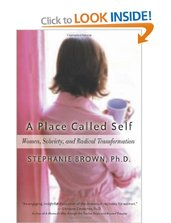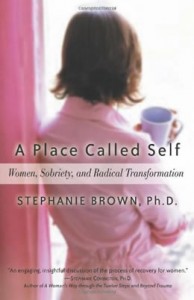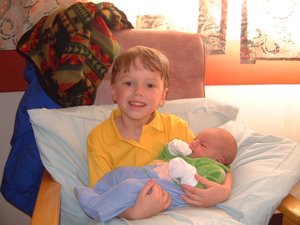A series of my blog posts based on Stephanie Brown’s wonderful book, A Place Called Self: Women, Sobriety, and Radical Transformation. In her book, Stephanie talks about what happens to women in recovery, how they think, how they feel, their problems, the good things, etc. (The book is relevant to men as well!)
What Happens to Women in Recovery: Stephanie Brown
 In the Resources section of the website, I have a series of my posts under the title Stephanie Brown on Recovery. These posts are based on Stephanie Brown’s wonderful 2004 book A Place Called Self: Women, Sobriety, and Radical Transformation. In her book, Stephanie talks about what happens to women in recovery, how they think, how they feel, their problems, the good things, etc. (The book is relevant to men as well!) Here is the main part of the first of my posts, entitled ‘What is Recovery’, according to Stephanie Brown (Part 1).
In the Resources section of the website, I have a series of my posts under the title Stephanie Brown on Recovery. These posts are based on Stephanie Brown’s wonderful 2004 book A Place Called Self: Women, Sobriety, and Radical Transformation. In her book, Stephanie talks about what happens to women in recovery, how they think, how they feel, their problems, the good things, etc. (The book is relevant to men as well!) Here is the main part of the first of my posts, entitled ‘What is Recovery’, according to Stephanie Brown (Part 1).
“‘Recovery has held so many surprises for me. Some good. Some bad. I didn’t know I could hurt so much. But I also didn’t know I could love so much and be so loved. I had no idea that recovery was also learning how to be in intimate relationships, learning how to have close, wonderful friends. Then there’s my marriage. My husband and I have developed a rich life together. And get this – I really like myself now. Learning about who I am and accepting me, that’s been the hardest part of recovery – and the best. I wouldn’t trade this path for anything in the world.’ Anne, Recoveree
Essential reading: ‘Speed’ by Stephanie Brown, Ph.D
I’m reading the excellent book, Speed: Facing Our Addiction to Fast and Faster – And Overcoming Our Fear of Slowing Down, by one of my favourite recovery thinkers/writers, Stephanie Brown. It’s well worth reading. Here is what is written on YouTube.
‘MORE, BETTER… SLOWER.
Feeling rushed, out of control, and overwhelmed?
Feeling like you can’t keep up…and can’t stop?
It’s not just you.
From the need to be constantly connected and the changing definition of “work hours,” to unrealistic expectations of instant gratification, our bodies and brains are being harmed by habits that, as with any kind of addiction, promise short-term satisfaction while doing long-term damage.
‘Experiencing Recovery – Part 7′ by William L. White: Family Recovery
Bill briefly describes how many families fall apart during the early stages of recovery and points out that as a society we do very little about this. Stephanie Brown describes this effect on family as the trauma of recovery.
‘Unraveling the Mystery of Personal and Family Recovery: An Interview with Stephanie Brown, PhD’ by Bill White (Part 5)
 Bill White: Your work has enhanced understanding of the intergenerational nature of alcohol and other drug problems. Have you envisioned how such intergenerational cycles might finally be broken?
Bill White: Your work has enhanced understanding of the intergenerational nature of alcohol and other drug problems. Have you envisioned how such intergenerational cycles might finally be broken?
Stephanie Brown: I think we’ve started to name and describe what happens in addicted families across generations, which is helping us understand family addiction and the complexities of family recovery. And I think we are poised to move beyond our current focus on the genetic and neurobiological influence on intergenerational transmission of addiction to include exploration of the larger psychological and social processes involved.
We need more family research to understand the transmission process and the kinds of family and community support processes that can influence these cycles and positively disrupt them.
‘Unraveling the Mystery of Personal and Family Recovery: An Interview with Stephanie Brown, PhD’ by Bill White (Part 3)
 ‘Bill White: In 1999, you published a book with Virginia Lewis that virtually transformed my own understanding about family recovery from alcoholism. Could you share with our readers how the book came to be written and some of its major conclusions?
‘Bill White: In 1999, you published a book with Virginia Lewis that virtually transformed my own understanding about family recovery from alcoholism. Could you share with our readers how the book came to be written and some of its major conclusions?
Stephanie Brown: The book came at the end of a ten-year research project that Virginia and I undertook in 1990 to study the process of recovery for the family. I had always wanted to know what happens to the whole family when the drinking of one or both parents stops.
We asked the same main question I had asked previously: is the process of recovery for the family similar to the process for the individual, and do the stages of active addiction and recovery I identified for the individual hold true for the family? We discovered pretty quickly that these stages do hold true and that they are a good guideline for understanding what happens with recovery growth following abstinence.
New Resource: Stephanie Brown on Recovery
 I’ve added the following to the Resources section.
I’ve added the following to the Resources section.
‘These blogs are based on Stephanie Brown’s wonderful book, A Place Called Self: Women, Sobriety, and Radical Transformation. In her book, Stephanie talks about what happens to women in recovery, how they think, how they feel, their problems, the good things, etc. (The book is relevant to men as well!)
What is Recovery? (Part 1)
“Recovery has held so many surprises for me. Some good. Some bad. I didn’t know I could hurt so much. But I also didn’t know I could love so much and be so loved.”
‘Unraveling the Mystery of Personal and Family Recovery: An Interview with Stephanie Brown, PhD’ by Bill White (Part 2)
 Stephanie Brown has written an excellent book on personal recovery, from which I have used some key sections in my blogs. She emphasises a number of paradoxes in recovery which are described here. There’s some powerful stuff below, which I had never really thought about until I read Stephanie’s work.
Stephanie Brown has written an excellent book on personal recovery, from which I have used some key sections in my blogs. She emphasises a number of paradoxes in recovery which are described here. There’s some powerful stuff below, which I had never really thought about until I read Stephanie’s work.
‘Bill White: Speaking of impact, you wrote a book called A Place Called Self: Women, Sobriety and Radical Transformation that has deeply touched many people. Could you share some of what you infused into that book?
Stephanie Brown: At the time I wrote A Place Called Self, I was deepening my understanding of paradox. Hazelden asked me to explore some of these paradoxes from the perspective of recovering women, although much of what I eventually wrote also applies to men.
“What is Recovery?” according to Stephanie Brown (Part 4)
 In my last blog focusing on Stephanie Brown’s book A Place Called Self, I described two myths about recovery. In this blog, we look at the second myth: dependence is bad and recovery means you are no longer dependent.
In my last blog focusing on Stephanie Brown’s book A Place Called Self, I described two myths about recovery. In this blog, we look at the second myth: dependence is bad and recovery means you are no longer dependent.
‘… many women think recovery is moving from dependence to self-sufficiency. But there is no such thing as total self-sufficiency. Self-sufficiency is a partial condition.’
So what does Stephanie mean by this? She is emphasising that all of us are dependent in some way or other. We need other other people on whom we can depend. ‘No man (or woman) is an island.’
“What is Recovery?” according to Stephanie Brown (Part 3)
 In A Place Called Self, Stephanie Brown emphasises that in recovery a woman transforms the way she thinks about herself, as well as the way she thinks about life itself. She points out two common myths about recovery, the first of which I’ll discuss here: ‘Recovery is moving from bad to good.’
In A Place Called Self, Stephanie Brown emphasises that in recovery a woman transforms the way she thinks about herself, as well as the way she thinks about life itself. She points out two common myths about recovery, the first of which I’ll discuss here: ‘Recovery is moving from bad to good.’
Many women think that being addicted is evidence of ‘shameful neediness, of deep and lasting failures.’ Many addicted women are trying to do their best, to be a good mother, wife and friend, yet they feel bad. They believe themselves to be a bad person.
“What is Recovery?” according to Stephanie Brown (Part 2)
 In an earlier blog, I referred to Stephanie Brown’s book A Place Called Self, in which she describes recovery as radical change in personal identity, or the self. Stephanie goes on to emphasise a number of myths about recovery.
In an earlier blog, I referred to Stephanie Brown’s book A Place Called Self, in which she describes recovery as radical change in personal identity, or the self. Stephanie goes on to emphasise a number of myths about recovery.
Firstly, the dictionary definition of recovery states ‘a return to a normal condition.’ This would suggest that in addiction recovery the person goes back to where they were before they became addicted. In fact, this is rarely the case. Stephanie emphasises that recovery is more like a starting over than a restoration of what was lost during addiction. This is because for many people the real self was never really developed.
‘What is Recovery?’ according to Stephanie Brown (Part 1)
 ‘Recovery has held so many surprises for me. Some good. Some bad. I didn’t know I could hurt so much. But I also didn’t know I could love so much and be so loved. I had no idea that recovery was also learning how to be in intimate relationships, learning how to have close, wonderful friends. Then there’s my marriage. My husband and I have developed a rich life together. And get this – I really like myself now. Learning about who I am and accepting me, that’s been the hardest part of recovery – and the best. I wouldn’t trade this path for anything in the world.’ Anne, Recoveree
‘Recovery has held so many surprises for me. Some good. Some bad. I didn’t know I could hurt so much. But I also didn’t know I could love so much and be so loved. I had no idea that recovery was also learning how to be in intimate relationships, learning how to have close, wonderful friends. Then there’s my marriage. My husband and I have developed a rich life together. And get this – I really like myself now. Learning about who I am and accepting me, that’s been the hardest part of recovery – and the best. I wouldn’t trade this path for anything in the world.’ Anne, Recoveree
This quote comes from the most wonderful book, A Place Called Self: Women, Sobriety, and Radical Transformation. Stephanie Brown’s book talks about what happens to women in recovery, how they think, how they feel, their problems, the good things, etc. (And before you ask, the book is relevant to men as well!)
Stephanie Brown describes recovery as a journey, a process. It is a radical change in personal identity (or the self). See the words drugs and alcohol there. Nup! You can recover from all sorts of things, like mental mental health problems, loss of a loved one, trauma, etc.
‘What is Recovery?’ according to Stephanie Brown (Part 1)
 “Recovery has held so many surprises for me. Some good. Some bad. I didn’t know I could hurt so much. But I also didn’t know I could love so much and be so loved.
“Recovery has held so many surprises for me. Some good. Some bad. I didn’t know I could hurt so much. But I also didn’t know I could love so much and be so loved.
I had no idea that recovery was also learning how to be in intimate relationships, learning how to have close, wonderful friends. Then there’s my marriage. My husband and I have developed a rich life together.
And get this – I really like myself now. Learning about who I am and accepting me, that’s been the hardest part of recovery – and the best. I wouldn’t trade this path for anything in the world.” Anne, Recoveree




